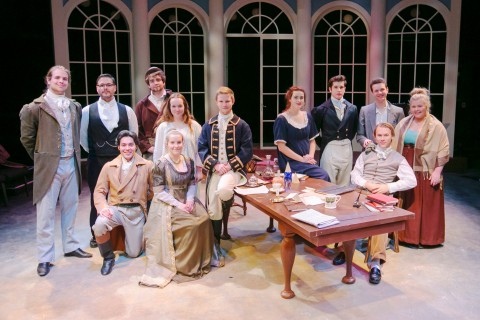Another performance season is underway at the Greystone Theatre, beginning with an ambitious adaptation of Tom Stoppard’s 1993 production Arcadia. The play merges science, philosophy, tragedy and comedy in an ambitious and fragmented tale of love and loss.
The play is directed by University of Saskatchewan drama department Professor Julia Jamison with drama students comprising the cast and crew. Jamison has been directing plays at the Greystone since 2005. Two of the actors — Julia Opdahl and Kody Farrow — are performing in the play as part of their Bachelor’s of Fine Arts degrees.
Arcadia takes place in two different time periods, switching back and forth between the 1990s and the late 1800s. Almost all of the characters in Arcadia are academics from various backgrounds who engage in frequent debates about the merits of classicism and romanticism, the divide between philosophy and the sciences, and other heady topics.

Actors from Arcadia pose for a photo.
In explaining the play, Jamison focused on the play’s spine — a concept that describes the motivations of the characters within the play.
“The spine of this play is a line right out of the play: ‘It’s wanting to know that makes us matter,’ so percolating at the heart of every character is the desire to know something, the passion for knowledge,” Jamison said.
In selecting the play, Jamison says her intent was to pick something that was intelligent and well-suited to her cast.
“It’s such an intelligent script, so there are big rewards just by virtue of that. The characters are all pretty age specific, meaning that most of the characters are within a believable age range of our students — so that’s appealing,” Jamison said.
With its high-minded academic influences and unconventional narrative structure, Arcadia certainly has a lot going on. At its core, the play tells the story of a brilliant and overlooked young mathematician and the multidisciplinary scholars who accidentally discovered her work over 100 years later.
The stunning set, developed for this production by drama student Rory Jewiss, is essential to the storytelling. Upstage, large windows stand in for the offscreen pastoral garden paradise from which the play derives its name, while a table placed in centre stage collects objects from both timelines and serves as a link between the two time periods being explored.
The most impressive aspect of the play is how Arcadia uses its subject matter to inform how the story unfolds. Earlier conversations about chaos theory and thermodynamics are repurposed towards the end of the play as the story itself becomes increasingly fragmented and experimental before reaching a state of equilibrium.
Staging a play that’s as clever and reference-laden as Arcadia is a difficult undertaking. To do the play justice, Jamison conducted a deep read in order to properly interpret the play and better understand it’s allusions to academia.
“This play has so many references that we combed through for our first read, and the actors had all been assigned to research one of the topics that surfaced in relation to their characters,” Jamison said. “We brought in a student of ours who takes acting classes, but he’s also a honours math student, to give us a tutorial on the math in the play.”
In Arcadia, the second law of thermodynamics — which dictates that heat can only be lost and cannot be created — is utilized to create a picture of a finite universe that will eventually end up cold and dark. Jamison says that, while the play is written in a comedic style, “there is that haunting aspect of it, of the fact that death is hovering.”
Arcadia is a complex work, but Jamison hopes that viewers will be able to follow the plotline and find emotional resonance in the tragic arc of the play.
“I want [viewers] to be engaged by the story — I want them to be charmed by the characters and to be moved by the end of the play.”
Arcadia will continue at the Greystone Theatre until Oct. 20.
—
Cole Chretien / Culture Editor
Photo: David Stobbe
Leave a Reply